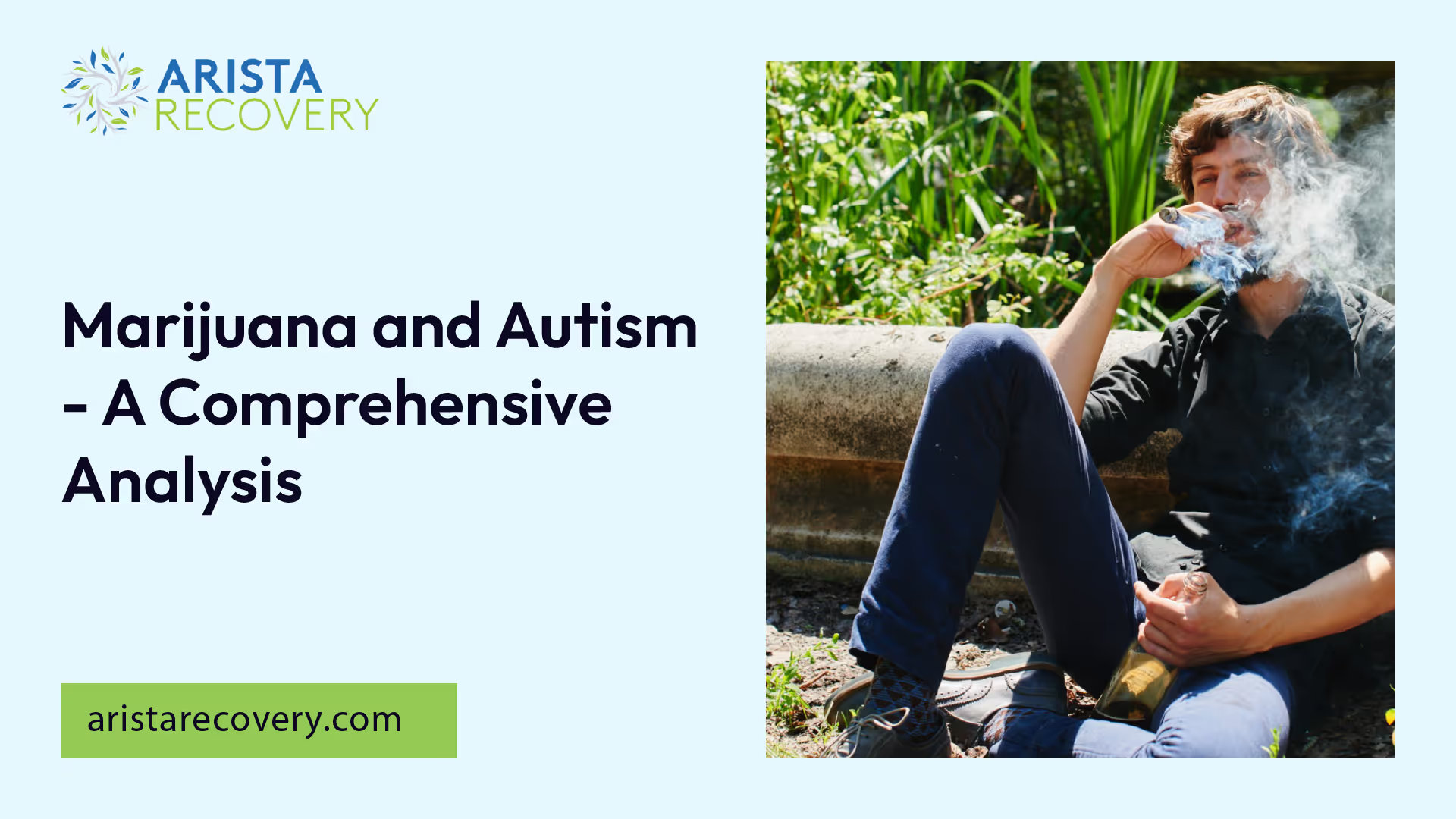Marijuana and Autism - A Comprehensive Analysis

Cannabis and Autism Spectrum
Understanding the potential benefits and drawbacks of cannabis, particularly in relation to Autism Spectrum Disorder (ASD), is crucial for breaking the stigma associated with marijuana and autism. Research has indicated that cannabis products may have a significant impact on ASD symptoms, in addition to fostering cognitive and social enhancements.
Impact on Symptoms
Several studies have noted that cannabis products can reduce the number and intensity of various symptoms associated with ASD. This includes hyperactivity, self-mutilation, anger, sleep problems, anxiety, restlessness, psychomotor agitation, irritability, aggressiveness, perseverance, and depression.

Clinical studies have also reported that Cannabidiol (CBD) treatment, an active ingredient in cannabis, reduced comorbidities in a variety of domains. This includes self-harm behavior, anger attacks, hyperactivity symptoms, sleep problems, and anxiety states in children with ASD. The average duration of CBD treatment for ASD children in these studies was 66 days, with mild side effects.
Cognitive and Social Enhancements
In addition to symptom reduction, cannabis products may contribute to cognitive and social enhancements in individuals with ASD. Improvements have been observed in cognition, sensory sensitivity, attention, social interaction, and language following the use of cannabis products. This suggests that cannabis may play a role in fostering better cognitive functioning and social skills in this population.
It's important to note, however, that these studies are primarily observational, and more research is needed to determine the full extent of cannabis's impact on cognitive and social enhancements in individuals with ASD. As the conversation around marijuana and autism continues to evolve, these findings provide valuable insight into the potential benefits of cannabis for individuals on the autism spectrum.
Medical Cannabis Use
Marijuana, or cannabis, has been increasingly recognized for its potential therapeutic effects on a range of medical conditions, including Autism Spectrum Disorder (ASD). The two primary active components of cannabis, cannabidiol (CBD) and tetrahydrocannabinol (THC), have shown significant promise in managing ASD symptoms.
Cannabidiol (CBD)
CBD, a non-psychoactive component of cannabis, has garnered significant attention for its potential therapeutic effects on a variety of medical conditions, including ASD. According to the Psychiatric Times, research suggests that CBD may be effective in alleviating symptoms of ASD.
In clinical studies, CBD treatment has been reported to reduce comorbidities in several domains in children with ASD, including self-harm behavior, anger attacks, hyperactivity symptoms, sleep problems, and anxiety states. The average duration of CBD treatment for ASD children in these studies was 66 days, with only mild side effects reported [2].
Furthermore, CBD appears to address multiple symptoms with a single preparation. It has potential anti-seizure activity, may enhance social behavior, and has evidence of being anti-neuroinflammatory.
Tetrahydrocannabinol (THC)
THC, the psychoactive component of cannabis, is typically used in medical applications to relieve pain, nausea, insomnia, and poor appetite. It's less controversial than CBD as it does not produce mind-altering effects and has potential antipsychotic properties.
Observational studies have shown that the use of CBD and THC in autism patients appears to be well-tolerated, safe, and effective in improving symptoms such as self-injury, aggression, hyperactivity, sleep problems, and anxiety.
Despite these promising findings, it should be noted that cannabis is currently prescribed as a treatment for autism in only 14 states. More research is needed to fully understand the potential benefits and risks associated with medical cannabis use for ASD.
Safety and Efficacy
A key aspect of understanding the relationship between marijuana and autism lies in examining the safety and efficacy of cannabis products when used by individuals with Autism Spectrum Disorder (ASD).
Tolerability in Patients
Several observational studies have demonstrated that the use of cannabidiol (CBD) and tetrahydrocannabinol (THC) in autism patients appears to be well-tolerated, safe, and effective in improving symptoms such as self-injury, aggression, hyperactivity, sleep problems, and anxiety [4].
It's important to note that these studies evaluated the effects of cannabis and cannabinoids on symptoms of ASD through subjective reports of parents/caregivers and the use of questionnaires or scales. Therefore, while the results are promising, more rigorous scientific research is needed to confirm these findings and fully understand the potential benefits and risks of cannabis use in autism patients.
Side Effects
Despite the reported tolerability of cannabis products in individuals with ASD, side effects have been observed. Studies have shown that the use of cannabis products in these individuals can result in mild and moderate side effects, such as sleep disorders, restlessness, nervousness, and changes in appetite [5].
Moreover, some patients have reported additional adverse effects including irritability, diarrhea, increased appetite, conjunctival hyperemia (red eyes), and behavioral problems. It's important to note, however, that these effects were generally temporary and not as severe as the side effects of traditional drugs used to treat ASD-related symptoms.
Despite these potential side effects, the reported benefits of cannabis use in managing ASD symptoms suggest that it may be a viable treatment option for some individuals. However, as with any treatment, it's important for patients and caregivers to discuss the potential risks and benefits with a healthcare provider before starting a regimen that includes cannabis. This ensures personalized care and monitoring, which is crucial for safety and efficacy.
Prenatal Cannabis Exposure
Prenatal exposure to cannabis has been a topic of increasing interest and concern, especially as cannabis use during pregnancy has doubled since the early 2000s in the USA. As per the recommendations of health organizations like the American College of Obstetricians and Gynecologists and the US Surgeon General, cannabis use during pregnancy should be avoided due to potential adverse effects on the neurodevelopment of the offspring.
Risks and Concerns
Using cannabis during pregnancy is linked to negative outcomes such as fetal low birth weight, which is recognized as a risk factor for Autism Spectrum Disorder (ASD). This correlation, however, is not fully understood as the study did not assess low birth weight as an intermediate step in the association between prenatal cannabis exposure and ASD risk [6].
Moreover, assessing cannabis exposure during pregnancy presented numerous limitations, including challenges in reporting exposure levels and lack of data on exposure timing, frequency, and doses. Important periods of potential exposure beyond the first trimester were also not evaluated, which highlighted the need for further research and study in this area.
Association with ASD
A study conducted in Ontario, Canada, between 2007 and 2012 found an association between prenatal maternal cannabis use and the incidence of ASD in children. The incidence of ASD was 4.0 per 1,000 person-years in the group exposed to cannabis, compared to 2.4 in the unexposed group, with a hazard ratio of 1.51 [6].
This association suggests that prenatal cannabis exposure might increase the risk of ASD. However, the complexity of this subject, coupled with the challenges in reporting and assessing cannabis use during pregnancy, indicates the need for further research to fully understand the relationship between prenatal cannabis exposure and ASD risk.
Endocannabinoid System
The endocannabinoid system (ECS) is a complex cell-signaling system that plays a crucial role in regulating a range of functions and processes in the human body. An increasing body of research suggests that it may also play a significant role in Autism Spectrum Disorder (ASD).
Regulation in ASD
The ECS has been found to participate in the regulation of social reward behavior, which is typically impaired in individuals with ASD. This has attracted considerable attention from neuroscientists and neurologists seeking to understand the underpinnings of ASD and develop effective treatments.
Moreover, the ECS is believed to play a putative role in controlling social anxiety and social reward, and has become a target for autism intervention in the last decade. Studies have shown a strong association between ASD and variants in endocannabinoid synthesizing enzymes, and post-mortem brains of ASD patients have shown reduced CB1 expression. Children with ASD have also been found to have lower circulating levels of endocannabinoids.
Therapeutic Potential
Given the involvement of the ECS in ASD, it presents a potential target for the treatment of autism. Genetic and epigenetic factors have been considered to be the main cause of autism, but it is known that the endocannabinoid and its receptors, which are widely distributed in the central nervous system, can provide a positive and irreversible change toward a more physiological neurodevelopment.
Furthermore, studies have shown that dysregulation of the immune system is a possible mechanism related to ASD pathogenesis and severity. Microglia, as the main producers of endocannabinoids under neuroinflammatory conditions, can be targeted to maintain the positivity of the central nervous system and improve the symptoms of autism.
In conclusion, the ECS offers significant therapeutic potential in the context of ASD. However, more research is needed to fully understand the mechanisms at play and to develop safe and effective treatments for individuals with autism. The future of research in this area looks promising, with numerous clinical trials underway to explore the effects of targeting the ECS on ASD symptoms.
Future Research
As the medical community continues to explore the potential relationship between marijuana and autism, a focus on future research is critical. This involves both clinical trials and targeting the endocannabinoid system (ECS) for Autism Spectrum Disorder (ASD).
Clinical Trials
Randomized, double-blind, and placebo-controlled clinical trials are necessary to further investigate the effects of cannabis and its cannabinoids on individuals with ASD. These types of trials are considered the gold standard in research and can help clarify the efficacy, safety, and tolerability of these substances in treating the core symptoms of autism. Thus far, only a couple of clinical studies have assessed the use of cannabinoids as treatment for ASD. A recently published placebo-controlled study showed that cannabidiol preparations were well tolerated in ASD and have the potential to improve core symptoms like irritability.
One of the cannabinoids under study is Cannabidivarin (CBDV), which is being evaluated for its effects on irritability in children with ASD. The Children’s Hospital of Philadelphia (CHOP) initiated an observational registry study to gather information about the use of medical cannabis in the pediatric ASD population [3].
Targeting ECS for ASD
There is a growing interest in the endocannabinoid system (ECS), a complex cell-signaling system in the body, and its potential impact on ASD. Researchers expect that treatments targeting the ECS will offer similar benefits and may provide an opportunity to develop safer, effective therapies and improve the quality of life for people living with ASD—not to change who they are as a person. Cannabinoids, which act on the ECS, are also opening doors for conditions other than ASD.
Cannabis and cannabinoids have shown promising effects in the treatment of symptoms related to ASD, including reducing symptoms such as hyperactivity, self-mutilation, anger, sleep problems, anxiety, restlessness, psychomotor agitation, irritability, aggressiveness, perseveration, and depression. These substances have also shown improvement in cognition, sensory sensitivity, attention, social interaction, and language.
As the scientific community continues to explore the potential of marijuana and autism treatment, it's important that rigorous clinical trials and targeted research are conducted. This will ensure that any potential treatments are safe, effective, and beneficial for individuals with ASD.
References
[1]: https://pubmed.ncbi.nlm.nih.gov/34043900/
[2]: https://www.ncbi.nlm.nih.gov/pmc/articles/PMC8568770/
[3]: https://www.technologynetworks.com/neuroscience/articles/what-does-the-endocannabinoid-system-have-to-do-with-autism-spectrum-disorder-363597
[4]: https://www.psychiatrictimes.com/view/medical-marijuana-for-autism
You’re not alone in this.
When mental health challenges and addiction intersect, it can feel isolating. At Arista, we offer compassionate, evidence-based, and trauma-informed care to help you heal, grow, and move forward.
You’re not alone in this.
When mental health challenges and addiction intersect, it can feel isolating. At Arista, we offer compassionate, evidence-based, and trauma-informed care to help you heal, grow, and move forward.
Support that moves with you.
You’ve taken a brave first step. At Arista Recovery, we’re here to help you continue with best-in-class care designed for long-term healing and support.
.webp)






